- Home
- Theodore Taylor
Billy the Kid Page 11
Billy the Kid Read online
Page 11
Lawyer Lapham piped up, "Sam had a gun, Willie. He wasn't shot in cold blood."
"How is he?"
"Flesh wound. He'll be all right," Lapham said.
Wilson asked, "How long did you plan to hide the fact that Bonney killed a man earlier this week?"
Willie fought for composure. It took a moment. "He ought to get a reward for it," he finally answered, avoiding the question. He heard the murmur in the crowd. Everything he'd done, every single thing, good intentions or not, had played into Wilson's hands.
Wilson laughed grimly, turning to the group. "Another example of our young sheriff's enforcing the law."
"You want to put me on trial out here, Pete, or do you want me to go get Billy Bonney?"
Wilson echoed his laugh. "I'll believe that when I see it."
Willie sighed. "Someone take Kate home. Mr. Lapham, stay here, please."
Ross Halloway, the court clerk, volunteered. "I'll take Mrs. Monroe home, Sheriff."
Kate came up. She'd been standing away from the group, listening. "You starting right away?" But her eyes said: Throw the badge in their faces.
"First light," Willie answered.
"Willis, I wish..."
Willie shook his head. "You better go, Kate."
She nodded, passing one of the packages to Halloway, then walked off toward the buggy park.
Head bandaged, Frank Phillips said, "He was spotted over near Beckmann's place at noon." Beckmann's was a general store on the outskirts of town.
"Anything else?" Willie asked.
"Yes," Wilson said. "I've got twelve men and three trackers standing by for you. Some bloodhounds."
"Stop right there, Pete," Willie said. "I'm going after him alone." His eyes went to Earl Cole. "And I'll shoot at any posse that follows me."
"But, Willis," Lapham interceded, "maybe you need some help this time."
Willie looked at the lawyer. "I know Almanac's tracks like I know my own face. Once I pick them up, I'll find him wherever he goes."
Kate had overheard and stopped. She frowned back at the towering figure of her husband in the circle of men. She took a deep, deep breath and continued on to the buggy.
Wilson's voice drifted behind her. "Sheriff, nobody's going to buy a hard-luck story this time. Yours or his."
At the buggy Kate laid the dress boxes on the seat and looked back toward the platform. "You ready, Mrs. Monroe?" Halloway asked.
"No, wait," Kate replied.
She saw her husband already walking away from the group, followed by Jack Lapham.
Wilson's enraged shout penetrated the depot area. "I'll give you two days. After that, I'll send a posse headed by a federal marshal. I'll even send troops out..."
Willie could feel his frenzy, almost fanatical, all the way across the platform but ignored the shout, finding his line of walk blocked by Kate.
She said, "I don't want you to go."
"There isn't much choice."
"Let the posse take him. That'll satisfy everyone, and you won't have nightmares as long as you live."
Willie shook his head. "I don't want twelve men blasting at Billy. I'll bring him back and resign. Then they can put Earl Cole in. He'd enjoy gunning Billy down."
Kate stood a moment, her hands on his shoulders. She said softly, "You know, I've never once changed my mind about you. I love you very much. Don't get killed."
Willie kissed her, then murmured, "Go home," moving around her to join up with Jack Lapham.
They walked slowly toward the courthouse. The old man rattled on about how foolish Billy had been. Willie answered in grunts, wishing he'd shut up.
In the office Willie poured a whiskey for Lapham, then one for himself. Downing his he said, "Write me a will, Mr. Lapham. Everything to Kate except my little parcel over by Goodnight. Give that to Gonzalvo." Goodnight was a nearby town.
"That your hired hand?"
"Yeh."
The old man squinted. "You figure on getting killed, Willis?"
Willie answered thoughtfully, "Not figuring on it, but it could happen."
7
ON THE WORN BOARDWALK beneath the tin-roof overhang of Polkton Hardware, easily identified by the largest sign on Decatur, Art and Perry Williams waited on a bench, their backs against wire grating that covered the windows, faces almost invisible in the cloudy night.
It had been an eventful afternoon.
About four o'clock, in the Union Saloon, Art had listened with great interest as a skinny man talked incessantly about Billy Bonney and the jailbreak. It seemed that he'd been in the jail next to Bonney a day or two before. The skinny man had a lot of information. For instance, he knew that the sheriff was coming back from Phoenix, and that Bonney had actually gotten Art's saddlebag. Dobbs was very talkative.
Finally, Art had gone up to him, introduced himself, and made a discreet offer of twenty dollars for more information, particularly about where folks thought Billy Bonney might be heading. Dobbs agreed to meet him later.
A few minutes after eight, Dobbs walked up, peering into the dimness under the hardware marquee.
"That you, Art?" he asked quietly.
"Sure is."
Dobbs mounted the boardwalk and sat down beside Art and Perry. "Maybe get some rain soon," he said.
"Settle the dust," Art replied.
Dobbs looked over at the Texan. "I keep wonderin' why you're so interested in Billy Bonney."
"I told you this afternoon, he owes me a debt. Considerable amount. I'd like to collect."
Dobbs laughed. "He might not be an easy man to collect from."
Trying to contain his annoyance, Art asked, "What'd you hear in jail?"
Dobbs said, "Well, now..."
"You want more?" Art asked, agitation rising. "All right, twenty more."
Dobbs said speculatively, "He's got a lot of money in that saddlebag. Over twelve thousand, he told me, and some jewelry."
"So I hear," Art said. "They sendin' a posse alter him?"
"Nope. Sheriff's going alone."
Even in the shadows there was shock on Art's face. "Alone?"
"That's right."
"You certain?"
"That's what he said. Threatened to shoot any posse." Dobbs paused to cough. "Why don't you let the sheriff lead you right to Bonney?"
Art peered a moment at his son, then, frowning thinly, he cast a thoughtful look on Dobbs. "You think he's got a chance o' gittin' him?"
"Main thing, Art, the sheriff thinks he has. Bonney is on the sheriff's own horse."
Art, nodding and reaching into his pocket for money, dismissed Dobbs. "Thanks, friend. What you jus' tol' me is worth fifty. How's that?"
Dobbs said lazily, looking up, "If you plan to go after him, maybe you need some more guns on your side. Me, for instance. From what I hear, Billy's pretty handy." The offer brought a silence.
Perry burst in, "Pa, that's a good idea."
Art, ignoring Perry, tried to see more of Dobbs's wedge-shaped face in the shadows, weighing him.
The lazy voice continued. "A quarter of what's in that saddlebag, and I'll even get another man. Pay him out of my share."
"Sure puts the odds on our side," Perry said, grinning at the beanpole hit man, unable to contain his enthusiasm.
Art scrubbed his chin. "Let's go have a drink an' talk it over."
They went back to the Union.
***
NEARING MIDNIGHT Dobbs stood in a living room in Cave Flat. "I don't know who those mysterious Texans are, Mr. Cole. But I can make a guess."
Earl Cole was disgruntled, barefooted and in his underwear, dull-eyed from being aroused. "Doesn't make any difference, does it, who they are..."
Dobbs shrugged. "That offer still stand? Shoot Monroe? I'm gonna be ridin' with those boys. Figure Monroe'll lead us right to Billy Bonney. I'll kill 'em both."
Cole stared at Dobbs. "You bungled it last time."
"I didn't have a clear shot at him. It was night. You know that." A spasm of cou
ghing grabbed Dobbs's chest.
Cole waited until it stopped. "It stands. You get the other twenty-five hundred if Willie comes back for a funeral. His own. If he doesn't, Dobbs, you better get out of Arizona."
"Either way, I'll do that, Mr. Cole," the Tombstone gun replied.
8
THE HORIZON WAS RED at dawn, an angry apple color that artists can never achieve. Above it were long, broken fillets of clouds, tufted dull cherry on the undersides. It had warmed during the night and the air was almost sultry.
Billy finished the scanty, tough meat that was on the hind leg of a roasted rabbit for breakfast. He'd shot it at dusk and skinned it out, but found he was too tired to eat much. Chewing without satisfaction, he looked off east, staring at the horizon. Rain is somewhere off there, he thought, a lot of it. And that was good. It would wash out tracks.
He turned his head to view Almanac. The gelding, always a joy to watch, feed bag on his nose, was concentrating on the last of grain Billy had gotten from Beckmann's store. "Make the most of it," Billy advised Almanac. "From now on it'll be grass and brush. Any leaves we pass, you better take a nip." He continued perusing the strapping horse "Tell you what, I'll make a deal with you. You git me outta here, an' first decent-sized town we come to, I'll buy a horse an' park you in the livery, then wire your owner to come an' git you. All right?"
Billy got up, stretching, and examined the red dawn again. "I got an idea he's gonna git anxious about us, git some more trackers—"
He walked over to his saddlebag, drew out two large pieces of rawhide, then searched around for his knife "—an' come after me again. Deacon, damn him!"
Billy sat down and began cutting the rawhide into two-foot squares. "What we truly gotta do is put thirty miles behind us today." He eyed the horse again. "I gave you a break yesterday. Sort of." He laughed.
They'd made it almost to the top of the first rocky range north of Polkton. Timbered in parts, it was mostly boulder country, forcing slow going, half the time on foot. There had been long patches of slickrock, sometimes on canyon ledges, and Billy had led the gelding, giving him help as the horse balanced and fought for a grip on the slippery surface worn by centuries of wilder, even wiser, hooves.
His campsite was under an overhang on the south brim of the range, not far from the trail, but Billy felt secure. No posse, even if one had been organized, would try that trail at night. They'd have to skirt black canyons where it took twenty seconds to hear the echo of a dropped pebble. Even in daylight a man's belly got tight looking down; a horse's eye got that wide look of panic as hooves skidded near the edges.
He'd awakened before the warm dawn to consider his position. He knew he might have to run the rest of his life, but that was better than having a noose slipped over his head. If he got caught, a bushel of bullets was still better than that rope. Thinking about Sam Pine, he'd spent a moment of regret. But he hoped that Sam, or someone, had told Willie about Pete Wilson. Then Willie would see that Billy Bonney had no other recourse. Willie definitely will understand, Billy thought.
He lifted one square of the rawhide, holding it up for inspection; then, satisfied with it, he rose again to take the four squares back to the saddlebag, stuffing them in. "I think we best mosey along," he said to Almanac.
After saddling up, Billy stamped the fire out and kicked dirt over it. He scrambled through some paltry rocks toward a lonely sentinel juniper, broke a branch from it, then returned to dust away marks of the night's stay. At a little past seven, he rode up over the crest of the range and started downslope on the snaking slickrock trail.
Almanac moved carefully along it, holding back, hooves feeling for purchase, shoes sparking now and then. Just after eight the gelding slid, screeching in pain, and Billy leaped from the saddle.
***
WILLIE GLANCED at the angry storm sky as he cantered out of the courthouse corral. The close air had that unmistakable prophecy of rain in it. Then about two hundred yards from the courthouse, he drew up, looking back to the second-floor window. It wasn't beyond Pete Wilson to post a lookout.
He saw no faces and tongue-clucked the Appaloosa to get under way again, digging him lightly under the ribs. He would have felt better if Almanac's power was beneath his legs, but the livery Palouse was a good, sturdy horse. He'd ridden it a number of times, spelling Almanac for one reason or another.
Willie had slept awhile on a cot in an empty jail cell. Maybe two hours. The rest of the time he had tossed and turned. He felt weary already; his mouth was sour and metallic from a hurried cup of warmed-over coffee.
A few stilts of smoke had begun to reach up into the slate morning from outlying houses. The road traveled flatland for several miles, then began following a curve around a ridge dumped with cottonwood groves. Their autumn-turned leaves drooped in the still, moist air.
During restless hours on the cot, Willie had thought about Billy's general destination, attempting to place himself on Billy's saddle. On the ride up from Phoenix, Kate had mentioned that Billy had talked vaguely of going to California. Monterey, perhaps. Some crazy thing about seeing the sea. That would take him west.
***
"CY AROUND?" Willie asked. Lettie Beckmann shook her head. She was about sixty-five, white-haired, motherly and aproned, wearing a man's high-laced shoes. "No, dern beavers have dammed the creek again. First good rain, an' it's a-comin', we'll get that whole bottom awash. He went down there 'bout an hour ago to pull it apart. Come on in, Sheriff, set a while."
Staying mounted, Willie asked, without attaching great importance, "You remember Billy Bonney?" He'd drawn up not three feet from Almanac's tracks. They'd led off the road and straight into Beckmann's store.
"Sure do," Lettie said. "He was by here yesterday."
"What time?"
"Oh, 'bout this time. Maybe a little earlier. We hardly recognized him. Hadn't seen him since you two ranched. He's cut that mustache off. Said he'd been down in Mexico, of all places. He sure looked good, all dressed up."
Willie nodded. "Did he say where he was going?"
Again the kindly face rotated side to side. "Naw. First tol' us he was jus' ridin' by. Then said he'd decided to go huntin'." She paused. "Come to think of it, he had your big white gelding."
"He borrowed it," Willie said. "Lettie, ah ... when was the last time you were in town?"
"Been a month almost. We're due to go in next week, 'less Cy changes his mind."
She doesn't know about the train robbery, Willie thought. And it wouldn't serve a purpose to tell her. More than that, he didn't want to tell her. Call Billy a thief?
"Billy get anything from you?" Willie asked.
Lettie frowned. "What do you mean?"
"Oh, food. I'm just trying to figure out how long he plans to stay hunting."
Lettie was still puzzled. "Why, I gave him some vittles. Cy gave him some grain for his horse. Billy's a nice boy, always smilin'." She paused. "He also got some rawhide from Cy."
"Rawhide? What'd he want that for?"
"I don't know, Sheriff. I reckon maybe it had somethin' to do with huntin'. Plenty of antelope up there now." Her head wagged toward the high mountains. "You tryin' to catch up to him?"
Willie nodded. "Yeh, Lettie."
"Well, he picked up the west trail jus' this side of Macombers. Reason I know is that Cy saw him start up."
Willie nodded again. "Tell Cy I'm sorry I missed him."
As he reined around, Lettie said, "He'll feel that way, too. Drop in on your way back."
Over his shoulder, Willie answered, "111 do that. Thanks, Lettie," and trotted off for the Macombers trail, again picking up Almanac's shoes. They laid tracks on the road, then turned sharply west where the Macombers converged, then began the long climb through small buttes toward the top of the first humpback.
Willie drew up sharply, jerking the Winchester from its scabbard, when brush broke ahead. He relaxed, with a staccato laugh, as an old battered steer stared at him an alarmed moment, then crashed a
way.
Driving the Appaloosa hard, by midafternoon he located Billy's campsite of the previous night, then moved on to quickly top the humpback. Deciding to rest the horse, he found a vantage point on a ledge For almost a half hour, chewing on jerky strips, Willie used his binoculars to work over the rough country in front of him.
If Billy still had California in mind, he'd probably go through the rugged country northwest of Polkton, living off the land and any negligible water he could cup out in the draws, then cross desolate southern Nevada. Neither man was a stranger to that wild country, and if Billy got far enough into it, no one would ever catch him.
As the light increased to a chalk gray, Willie pressed on toward the ridges, the blue-spotted Palouse striding out, snorting and warming its muscles.
In soft dirt on the left side of the road, Almanac's prints telltaled along, molded by the night's heavy dew. The new shoes were sharp and clear. His right hind hoof had a peculiar way of angling in. Without doubt, the fine white horse had banged over this trail.
Three miles along, Willie suddenly sensed he was being watched and saddle-turned to look behind. The trail was deserted back there. A horse whinnied faintly from somewhere high. He drew up to scan the nearest ridge because the sound seemed to come from up there. But the light was so flat that the gray-green scrub and dabs of red-orange cottonwoods and sycamores appeared a solid mass.
He went on, still feeling eyes on him.
***
"WE'LL JUS' TAG HIM nice an' slow? said Art. "He'll lead us to Billy?
Watching Monroe on the road from the ridge slope, he held a thumb up and sighted over it. "Sure looks like a big man, big as that horse," Art said.
"That he is," Dobbs answered. "One night I saw him take a two fifty-pounder and handle him like he was a midget."
Art said, "Hmh. I don't intend to get that close."
The four riders, hidden in cottonwoods, were observing the sheriff.
"Tell you what, I'll take him and you take care of Billy Bonney," Dobbs suggested.
Art laughed. "I got no desire to shoot a sheriff. I am ever desirous of shootin' Billy Bonney."

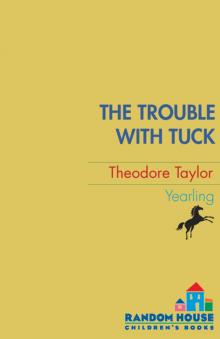 The Trouble With Tuck the Trouble With Tuck
The Trouble With Tuck the Trouble With Tuck The Bomb
The Bomb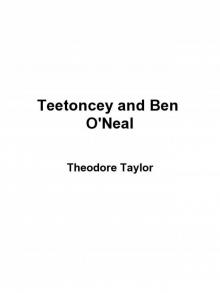 Teetoncey and Ben O'Neal
Teetoncey and Ben O'Neal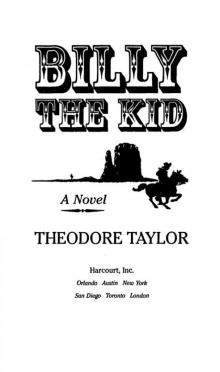 Billy the Kid
Billy the Kid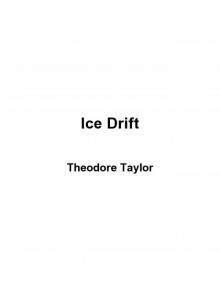 Ice Drift
Ice Drift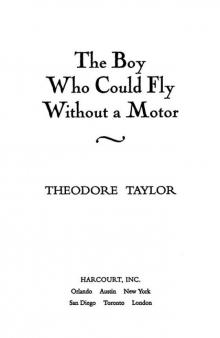 The Boy Who Could Fly Without a Motor
The Boy Who Could Fly Without a Motor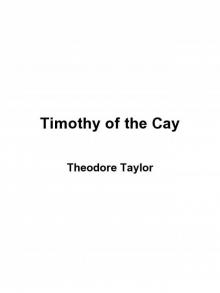 Timothy of the Cay
Timothy of the Cay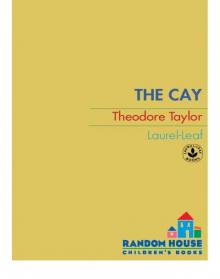 The Cay
The Cay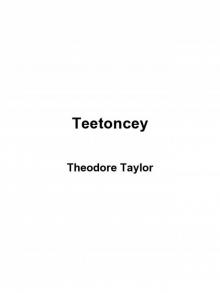 Teetoncey
Teetoncey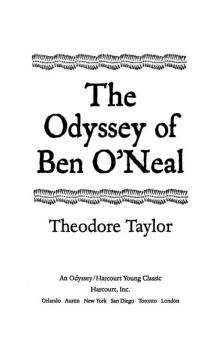 Into the Wind: The Odyssey of Ben O'Neal
Into the Wind: The Odyssey of Ben O'Neal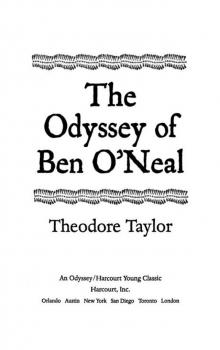 The Odyssey of Ben O'Neal
The Odyssey of Ben O'Neal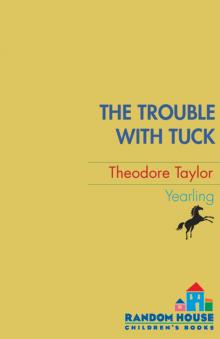 The Trouble with Tuck
The Trouble with Tuck